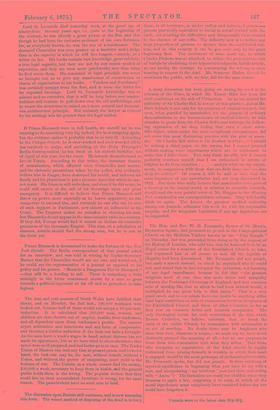The Hon. and Rev. W. H. Fremantle, Rector of St.
Mary's, Bryanston Square, had promised to preach in the Congregational Church on the Holborn Viaduct known as the "City Temple" on Thursday, but was prevented from doing so by the request of the Bishop of London, who told him that he believed it to be an illegal course for a minister of the Established Church to take, and requested him at all events to wait till the legality or illegality had been determined. Mr. Fremantle did not preach, but made a speech instead, in which he explained why be could not, and stated that he had accepted the invitation, not knowing of any legal impediment, because he felt that "the greatest religious need of our time was more union and sympathy between the Protestant Christians of England, and that common acts of worship like that to which he had been invited would, if multiplied, be one great help to that union." That is a very good creed, and to our minds there can hardly be anything sillier than legal restriction on acts of communion between clergymen of the Established Church and those of other Churches, so far as they rest on common faiths and common sympathies. The only theological excuse for such restrictions is the idea which Roman Catholics, we believe, entertain, that to break the unity of the visible Church by communion with schismatics is an act of sacrilege. No doubt there may be Anglicans who share that view, whatever it means,—we must say we have never distinctly grasped the meaning at all,—but no one proposes to force them into communion with what they abhor. That those who recognise no superstition of the kind should be legally restrained from joining formally in worship in which their heart is engaged, would be the most grotesque of ecclesiastical restraints. Mr. Fremantle spoke, but did not preach. Is there anything of mystical significance in beginning what you have to say with a text, and interpolating "my brethren" now and then, and ending with " Amen "? The formalists are really too childish when they threaten to apply a law, supposing it to exist, of which all the moral significance must completely have vanished before any one could have forgotten it.


































 Previous page
Previous page